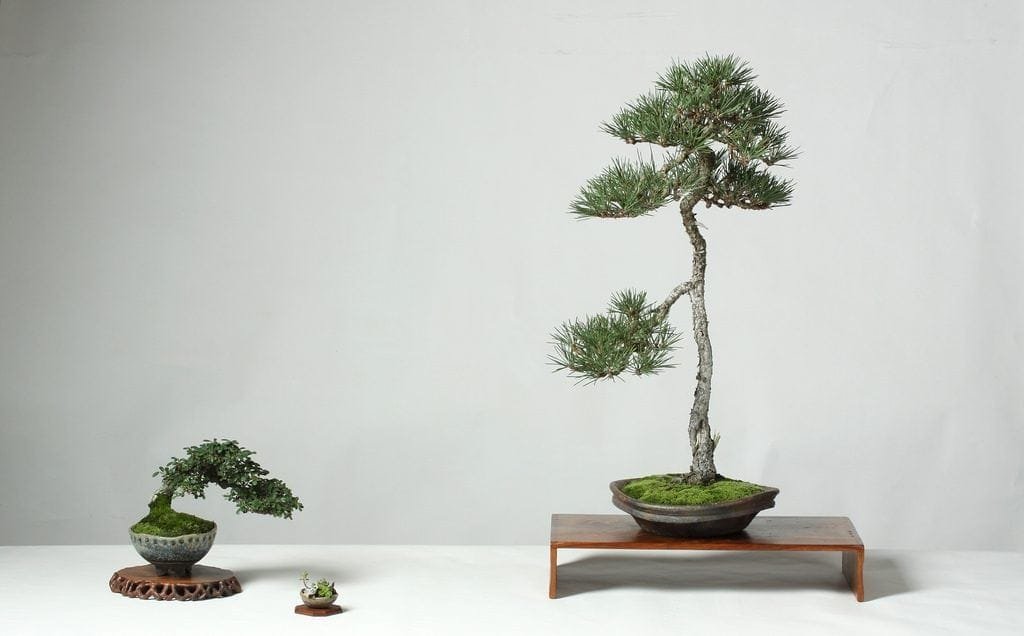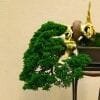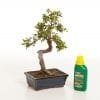Feng shui and bonsai are both intricately interconnected with the ancient Asian lifestyle and beliefs.
Even though the practice of Feng Shui is attributed to the Chinese, while the art of bonsai was developed by the Japanese, there are more so many things one can learn and adapt by the right combination of the 2 disciplines.
The art of bonsai once mastered, will leave such an amazing imprint on the mind that the way a bonsai cultivator perceives the world can never be the same again.
But there is also so much more to merging Feng Shui and Bonsai!
Both of these practices show how subtle is the energy which rules your existence and how deep the roots of beauty and simplicity can reach to heal all your fears, prejudices and misfortunes.
Did you know that bonsai and feng shui is such a perfect match?
Let’s delve into learning more about the fusion between Feng Shui and Bonsai which can help you gain balance and harmony in life.

Feng-Shui, Bonsai & The Sacred Journey of the Soul
Have you ever felt that urge, the desire to clear your head, purify your mind and embrace that inner feeling of a constant, invisible smile, shining in your soul?
That smile, that light is your purpose in life.
What will you leave behind you?
But most importantly, what will you leave written there in the deepest memory of your soul?
It is through bonsai and Feng Shui that one can attain peace of mind, along with attracting prosperity, positivity, and love but such an explanation would be way too shallow to describe the real value of these 2 practices.
Thus, the only way to truly understand the meaning of both bonsai and Feng Shui is to learn more from the lessons of history, or why and how the ancient Asian civilizations started practicing and implementing bonsai and Feng Shui into daily life.
Subsequently, both the practices of Feng Shui and bonsai can become eye-opening and mind-altering.
But what’s more, gaining an in-depth understanding of the incredible Asian practices is not an outdated approach to living a life in harmony.
Nowadays, it gets even more relevant to find something that can help you cope with the busy schedules and escape from the tension in your job, relationships, and thoughts.
The generations who inhabited this world long before us, were not at all detached from what bothers and shapes life as we know it nowadays.
Actually, the ancient civilizations that we can call our global ancestors were pretty much enchanted and boggled by the very same stuff, gravitating in the minds of people living in the 21st century!

Except for, our global ancestors were not biased about their role as an intricate part of Mother Nature.
Thus, Feng shui originated being an object of complex studies and observations of the Universal laws of the forces of Nature.
And these Universal laws are always relevant.
Fashion changes, public opinion changes, prices at the stock market also change but the profound truths, written by the hand of the Universal energy we are all bond with, remain the same.
The sun rises and falls; then the Moon rising and falling, too.
There is always the Yin and the Yang, the black and the white, the salt and the pepper, the real and the fake.
And all of these contradictory forces, working together to create what we call Balance – the most beautiful treasure and pleasure you can get to own in life.
Understanding the Magical Essence of Feng-Shui
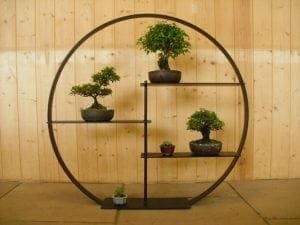
Feng shui focuses on the QI – the vital energy which penetrates our entire existence.
Interestingly, feng shui was first mentioned in a book which is called The Book of Changes or also known as YI jing.
Yi Jing is the oldest philosophical text in China.
Although the mists of time making it almost impossible to track back the exact age of the Book of Changes, it is considered that this text was written as early as 1022 to about 256 years BC during the reign of the Zhou dynasty.
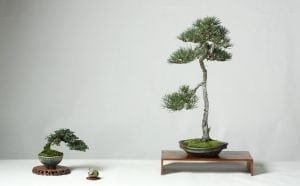
The Book of Changes is such an intricate piece of work! It has been looked upon from some of the most powerful rulers of the Asian dynasties, including statesmen, generals and nonetheless, emperors themselves.
Thanks to Confucius, the Book of Changes was included in the most significant texts when it comes to Confucianism.
But what’s more, the Book of Changes explains in text and symbols not only feng shui as a grounding of a successfully balanced life; feng-shui is listed right next to cult-classic studies, such as Acupuncture and Tai-chi,among others.
Surprisingly, feng-shui was not popularized for a very, very long time.
Instead, the laws and art of feng shui were transmitted only from father to son and they were allowed to be used only by the Chinese emperors.
That’s why nowadays, the very mention of feng-shui might sound to some like just another trend or exotic movement.
However, feng shui was actually treasured, praised, cherished and practiced only by a handful of people who we can call The chosen ones (or in other words, the elite).
Feng-shui was regarded as a mystical and magical knowledge which will grant those who understand and utilize it unseen wealthy luck in every aspect of life.
From Penzai to Bonsai: Bonsai Art as we Know it Today
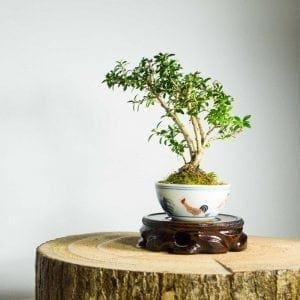
Now, both feng-shui and bonsai as we know it today originated in China.
But why do we call Japan the homeland of bonsai anyway?
Well, if it wasn’t for the Japanese, bonsai would have probably never developed into such an artistic trend and subsequently a beautiful hobby anyone can adapt and enjoy.
Although, calling bonsai simply a hobby is not appropriate. Instead, bonsai is more of a ritual and practice itself.
Bonsai cultivation is much like training. Although, with bonsai, you don’t train the body.
Bonsai trains the mind to attain patience, to self-reflect and emerge with your inner self each day, as you are tending your bonsai tree.
Long after the very first penzai trees were brought to Japan as souvenirs along with other imported products, the Japanese started gradually but surely evolving the art of bonsai into what we know it today.
Interestingly, after the end of World War II when the trade and communication between Asia and the Western world became much more open, the Chinese also introduced their forms of cultivating miniature trees.
But it was only the Japanese who were willing to share their skill and knowledge about bonsai cultivation.
In fact, if it wasn’t for their utmost care and desire to share the ancient knowledge, bonsai would have never been available to embrace by the rest of the world.
The Invisible Link Between Bonsai and Feng Shui

Gradually, through time and practice, bonsai, similarly to feng-shui, helps you get rid of clutter.
Similarly, feng-shui also highlights the importance of clearing clutter from the space you inhabit. Doing so is, nevertheless, intended to stimulate the clearing of all clutter in your life, including your thoughts.
Now, can you sense how interconnected are feng shui and bonsai?
Both of these practices literally fuse into each other.
The art of looking after a bonsai tree is a meditation for the mind, a practice for the senses and a game, where the brain opens both creatively and practically to study and become one with the always relevant laws of Mother Nature.
Ever since the Japanese started bonsai cultivation, it was only a matter of time that the practice developed throughout the years, starting from being very limited to mass-spread.
But above all, both feng shui and bonsai symbolize harmony, balance, and prosperity. The two practices involve understanding the forces of nature and implying them in everyday life.
Bonsai & Feng-Shui: Bringing the Wealthy Luck
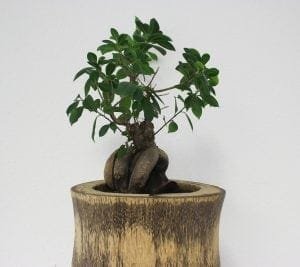
Apart from the beauty that feng shui and bonsai bring to the home, when practiced well and mindfully, these sacred and ancient practices can bring the so-called wealthy luck we mentioned above.
That wealthy luck applies to each aspect of life but especially in terms of your relationships with others and the mystical knowledge, which unites all the surrounding environment for working in your favor.
Then again, however diverse and spread in absolutely different ways – both originating from China but Japan turning into the heart of bonsai culture and cultivation, the 2 practices lead to one and the same path- the path of balance and harmony.
The principles of feng-shui are used to recreate the homes, offices, and literally all kinds of spaces, which people visit or inhabit.
Feng means Wind and Shui means Water.
Water and wind are two of the five major forces, which Chinese explored as part of learning how to upgrade the energy flow in one’s personal space as to remove all blockages.
It might seem very strange to the skeptics that some rearrangements in the design of a building – including both the outside and the inside design – can make up for a more balanced and happy life.
However, the laws of Quantum Physics have already proven what the ancient civilizations acknowledged and understood well thousands of years before we, modern life human beings, realized.
Everything is composed of energy. Out of this energy, there is only emptiness.
Check out this video for more tips and tricks on how to trigger your wealthy luck and lucky luck using the principles of feng-shui in 2018!
Have you noticed how sometimes you enter a room and immediately feel at peace? Or maybe you have noticed exactly the opposite – with the very moment you enter a particular space, you start feeling out of ease.

Feng shui simply suggests some common rules that serve to break the milestones which stop a particular space from prospering in harmony.
The forces of wind and water were studied for multiple years by the ancient folks, who found a very practical aspect to both of these natural powers.
Back in the years when Chinese peasants were building their shelters in search of an abundant land to give them food and living, they took note of something, which is extremely significant for their well-being.
The peasants, who built their houses unprotected from the wind, suffered failure as the mighty waves of air suddenly destroyed their homes at some point.
On the other hand, the peasants who took into consideration the direction and power of the wind as to build their shelters accordingly, staying away from the grip of the strong winds, managed to live peacefully and happily, without having to leave their destroyed homes and search for new land.
Nevertheless, water was looked upon as no less important than wind because high floods were not limited.
Thus, the peasants needed to acknowledge the way water works.
Moreover, they needed to build their villages near enough a water body as to utilize water for nurturing their crops but never stay too near as to risk getting their homes devastated by a flood.
When it comes to living in a modern-day home, however, those rules, which the ancient folks acknowledged so well, apply equally well.
Sure, we don’t need to look for ways to stop the wind or water from destroying our houses but what happens inside your home is no less interconnected to the forces of wind and water.
Wind and water form the 5 basic elements of the Universe, according to the Chinese – Fire, Metal, Earth, Water, and Wind.
Those 5 elements are present everywhere and they work best when in balance.
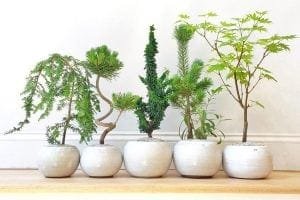
As feng shui dates back to approximately 4000 BC, the very first evidence of studying and applying the magnificent laws of nature in structuring a safe and harmonious living space was found on the alignment of the doors of people’s homes.
Back then, people would use the winter solstice and the position of the stars as a guide for the arranging.
However, it wasn’t before the 12th century, when Confucianism left an unforgettable imprint on popularizing feng shui as a more common-spread practice during the reign of the Song Dynasty.
The 19th century marked the true flourishing of feng shui when the Chinese governments created an intricate campaign in order to popularize feng-shui.
Multiple charts and diagrams, explaining the basic laws of the ancient practice, used to create peace, prosperity, balance, and harmony, were introduced to the public.
In fact, the massive movement for spreading feng-shui was the first to promote the benefits of this amazing practice, without trying to keep the secrets solely to the Chosen ones (predominantly only emperors’ families and some of the most well-respected generals and public figures).
Nowadays, the list of world-famous celebrities, using the power of feng shui to transform their lives is a solid proof of the way this mystical practice is actually working.
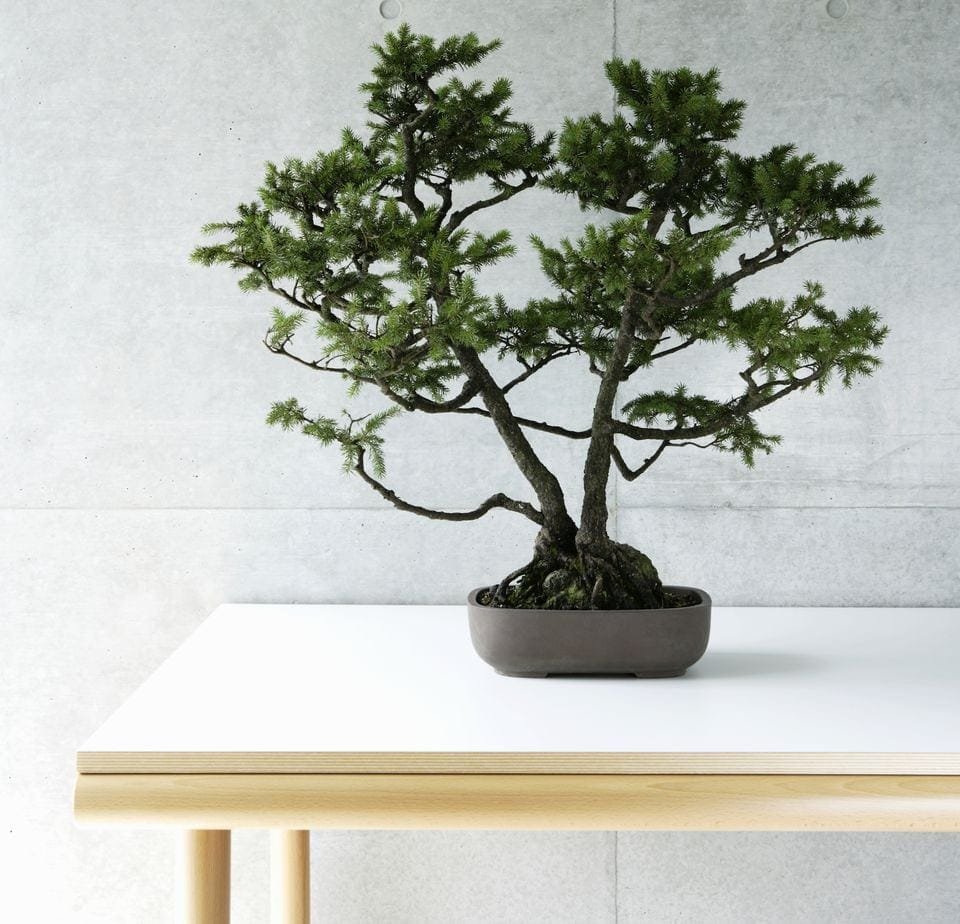
Richard Branson and Bill Gates are among the people, who openly share their love and gratitude for feng shui.
But the list goes on with Johnny Depp, Madonna, Steven Spielberg, Sophia Loren, Deepak Chopra, Cher, and Gwyneth Paltrow, among others.
Here’s what Oprah Winfrey herself shares about the magical and recreational power of feng shui
If you believe you still haven’t found your calling, it could be right in front of you. But the chi in your environment, for whatever reason, is blocking it. Maybe you live in too much chaos, with clutter in every corner. Or maybe obstacles (clutter, furniture, or geographical features) literally block the chi and opportunities from coming your way, so that you can capitalize on your true love, or what I call your true-life purpose.
Employing Feng Shui tips can help you get out of your own way to find what it is you are really meant to do. And once you discover this, the pieces will fall into place. Other people have found their calling, but their environment is not in alignment with that purpose. Feng Shui can help with that, too.
Oprah Winfrey
How to Merge Feng-Shui & Bonsai for Prosperity, Harmony & Balance
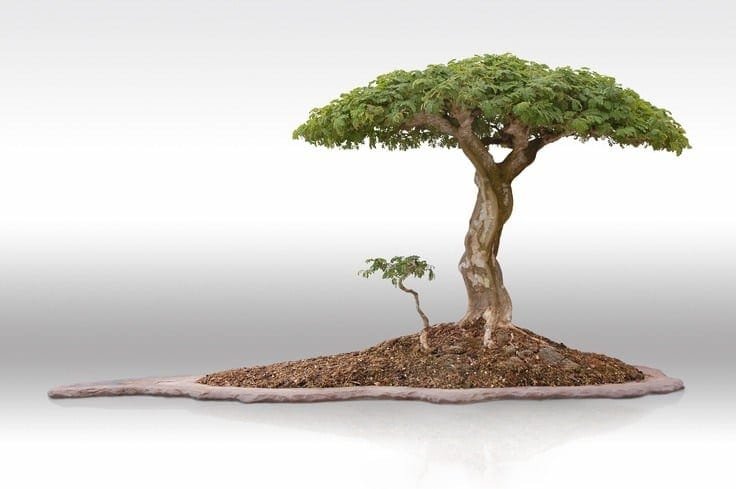
The major guidelines for utilizing feng-shui to attract luck, peace, and harmony to your surroundings include avoiding and clearing clutter as much as possible.
- Clutter in your living space creates clutter in your mind. And a cluttered mind cannot possibly function properly.
- Feng-shui also suggests that there should be a clean line as far as your sight can reach from chair positions to doors.
- On another note, when it comes to the very place where you take a restin your homes, such as a sofa or your bedroom, straight lines and sharp corners should be avoided at any cost. Both of these block the free flow of rejuvenating energy which helps to free the body and mind from the daily tensions.
- According to feng shui, curved and twisted roads can be used to confuse and subsequently eliminate evil spirits. That rule is best applied in an outdoor space, such as your garden or backyard.
- Mirrors, chimes, and crystals also have a sacred and powerful use and meaning in feng-shui.
Thus, the ones who know how to position these reflecting items in their surroundings will harness a protective and stimulating energy, which is created through the magic of reflection.
Bonsai trees are an intricate part of feng-shui since it is highly recommended to place a living creature in your feng-shui friendly environment.
Plants are considered wonderful for increasing the flow of QI, however, bonsai trees are absolutely superior, compared to other possible alternatives.
On the one hand, bonsai trees can live up to hundreds of years, saturating the home with an in-depth bond between the harvested energy from one generation to another.
Confucianism cherishes the human’s place in the balance of the world, believing that once we leave the physical realm, the spirit can keep protecting its family members through invisible niches, where the energy is saturated.
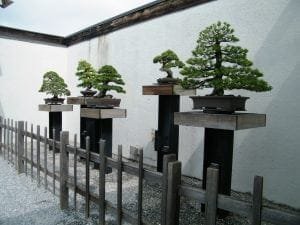
In order to look after a bonsai plant, one has to concentrate his energy and will into sculpting and training the bonsai creation.
Thus, not only massive amounts of energy get forever intertwined in the bonsai tree. The creator of bonsai is also fulfilling another important law of feng-shui – embracing the 5 vital elements of happy life.
Trees represent the symbol of wood, or also the symbol of the earth itself.
Subsequently, bonsai is believed to bring the important element of wood into the home, which would have otherwise be truly hard to achieve.
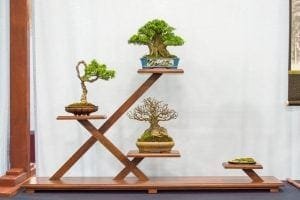
Wooden spoons, tables, chairs or any other wooden objects you may have in your home are simply not alive.
Sure, the wooden element is present and this is good for your house but the power of the wood’s energy is thousands of times stronger when you are dealing with a living creature, such as bonsai.
Trees do also have a very important role in the way ancient folks perceived the world. According to some beliefs, the trees are in constant meditation and they are among the strongest spirits on the planet.
They live in full harmony with the surrounding world without causing harm to none but sustaining the balance, needed for our survival, as well.
Yes, the trees are the lungs of this planet, and we, human beings, also feed on the oxygen they produce in return.
Feng-shui highly recommends placing bonsai trees in the east, south, and south-east corners of the space you are inhabiting.
Moreover, bonsai trees can help to make sharp lines softer, ensuring a proper transition and flow of the energy, removing blockages and tension from the space.
In fact, some spaces are referred to as dead, according to the feng-shui rules.
Dead energy must be avoided at any cost because it limits the chances of prosperity and rebalances the Yin and Yang in the surroundings.
Apart from the healing properties of the trees, their natural ability to support the flow of Qi is what makes them unique in every meaningful way.
If you place a bonsai tree in a place where much negative energy was saturated, it will certainly die. But before dying, it will absorb and eliminate part of the adverse energy from the place.
It is not an exception to replace the dead bonsai tree with another just to see the new one dying, as well.
And if with the first tree you might have had your doubts on whether the death was caused by the unfavorable energy field, then the same effect on the second tree is a sure indicator that your bonsai has just saved you from absorbing that negative energy yourself.
Plants are incredibly sensitive creatures.

Amazingly, plants can sense and tolerate light in a much more complex way that we, as human beings, can possibly adopt.
Just imagine a ray of light. What you see is limited. You don’t know the light like plants do. You see one single color but plants perceive the entire light spectrum (the thing we can actually see only when a rainbow emerges in the sky).
But what’s more, plants do not only see the entire light spectrum – they use the different colors in that spectrum differently.
Check out this mind-blowing experiment which IKEA included in their stores worldwide is a massive indicator of how sensitive plants are (no less sensitive and understanding than people!)
Feng-shui & Bonsai –Final Food for Thought
According to an old Japanese saying, people have 3 faces.
The first face, you show to the world.
The second face, you show to your close friends and your family.
The third face, you never show anyone.
Practicing and merging feng-shui and bonsai is all about embracing your truest face.
Showing the truest, most sacred part of yourself doesn’t need to happen in public. The sky is also the world. The grass is also the world.
YOU are also the world.
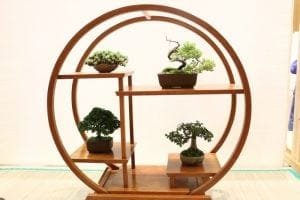
The pathway to prosperity and balance is not something you reach.
It is a road you walk each and every day with conscious efforts, small steps, awareness, tranquility, and dedication – just like looking after a bonsai tree and embracing the principles of Feng Shui.
Just like the Asian monks believe their practice and study is never going to end, so must we remember that our wealthy luck and happiness is in our own hands, our own understanding, and our own willingness to evolve.
As a result, when the principles of Feng Shui are applied to Bonsai, each person can create a well-balanced natural landscape, which will bring the much-needed balance in the surrounding environment, in return.
Bonsai trees are a beautiful way to bring the positive energy and nature to the home.
Both the positive energy and nature associated with the major principles of practicing Feng Shui to increase the harmony and prosperity in each home and family.
